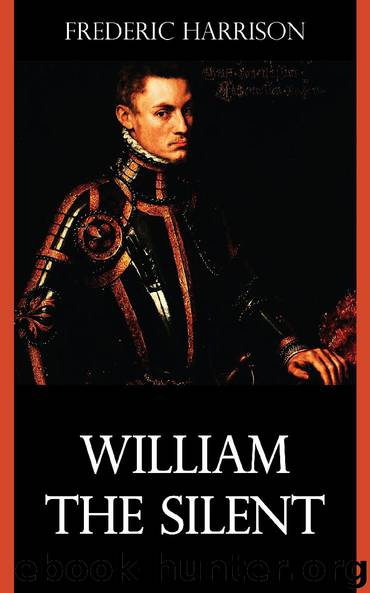William the Silent by Frederic Harrison

Author:Frederic Harrison
Language: eng
Format: epub
THE DEATH GRAPPLE—NEGOTIATIONS—ABANDONMENT 1572-1574
FROM HENCEFORTH WILLIAM OF Orange was settled in Holland, and he clung to it whilst life remained. After the débandade of his mutinous army, amidst constant perils from traitors and assassins, he passed the Rhine, and pressing northwards with a few followers, he tried to strengthen the defences of Zutphen, Kampen, and other places. “Alone and abandoned on every side,” he writes to John, he crossed the Zuider Zee; and, having recognised the Government at Haarlem and at Leyden, he fixed his residence at Delft, which became his permanent home.
Now begins that series of terrific struggles in the Dutch towns and their heroic defence, whereby, in spite of defeat, massacre, and horrible sufferings, they wore down the armies of Spain; and ultimately, by endurance of agony rather than by military success, achieved the independence of the Northern Provinces.
On entering Mons, after the retreat of Count Louis and his soldiers, Alva exacted a bloody vengeance on the citizens, which was prolonged till the time of his successor. He then proceeded to sack Mechlin, which ill-fated town was delivered over to butchery, torture, rape, and indiscriminate plunder, till every article of value, sacred or profane, had been rifled by the infuriated soldiery, thirsting to recoup themselves their arrears of pay. Philip was informed by one of his agents that they had not left an clou aux murailles, and had tortured wives, maidens, and boys to force them to reveal concealed money. Alva assured Philip that this chastisement was the manifest purpose of God, but they had not had chastisement enough. He passed on with his valiant son, Don Frederic, to the Northern Provinces. Dripping with blood, and laden with spoil, his soldiers stormed Zutphen, where the same scenes of horror were repeated. The Duke reports to Philip that he had ordered his son “not to leave a man alive, and to set fire to the city in various places.” This, he adds, had been done, and promises a most blessed result.
When butchery and rape were exhausted, Don Frederic passed on to Naarden, a little town on the Zuider Zee, near Amsterdam. The massacres at Naarden were even more horrible and more systematic than at Zutphen. The population was exterminated and the city burnt to the ground, which even the Jesuit historian calls “not a punishment, but a crime.” Alva duly reported this work to the King, who congratulated the Duke on exacting so well-deserved a vengeance, and Don Frederic as being so truly the son of his father. Alva, it must be remembered, was always straight-forward, frank, and perfectly conscientious in his own sense of duty to his King and his God. He conceals nothing, palliates nothing; he neither denies his failures nor exaggerates his success; his record of massacre and tyranny is all signed with his own hand.
The bloody progress of Alva from Hainault to the Zuider Zee had crushed out all sign of opposition, and he proudly reports to the King the places which he had subdued and occupied.
Download
This site does not store any files on its server. We only index and link to content provided by other sites. Please contact the content providers to delete copyright contents if any and email us, we'll remove relevant links or contents immediately.
Fanny Burney by Claire Harman(26602)
Empire of the Sikhs by Patwant Singh(23084)
Out of India by Michael Foss(16853)
Leonardo da Vinci by Walter Isaacson(13336)
Small Great Things by Jodi Picoult(7139)
The Six Wives Of Henry VIII (WOMEN IN HISTORY) by Fraser Antonia(5514)
The Wind in My Hair by Masih Alinejad(5095)
A Higher Loyalty: Truth, Lies, and Leadership by James Comey(4960)
The Crown by Robert Lacey(4814)
The Lonely City by Olivia Laing(4801)
Millionaire: The Philanderer, Gambler, and Duelist Who Invented Modern Finance by Janet Gleeson(4478)
The Iron Duke by The Iron Duke(4354)
Papillon (English) by Henri Charrière(4274)
Sticky Fingers by Joe Hagan(4197)
Joan of Arc by Mary Gordon(4109)
Alive: The Story of the Andes Survivors by Piers Paul Read(4031)
Stalin by Stephen Kotkin(3965)
Aleister Crowley: The Biography by Tobias Churton(3640)
Ants Among Elephants by Sujatha Gidla(3467)
